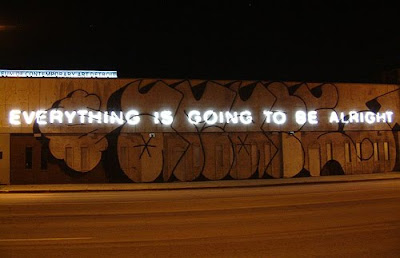Seeing how my reading of books has recently far out-paced my reviewing of them, I'm attempting to catch up with three mini reviews today and three more to follow shortly. Mea culpa for my tardiness, and enjoy your weekend, sweetness.
(418 pages, 2007 - paperback)
You may remember that I finally read
The Amazing Adventures of Kavalier and Clay last summer and loved it so much that it's now safely on the short list of my all-time favorite books. Eager to read more Chabon this summer, I dusted off my unread copy of
The Yiddish Policemen's Union and hoped that it was at least half as good as "Kavalier and Clay." And half as good is about right.
Perhaps the best thing about this book is its premise. The Yiddish Policemen's Union is a noir murder mystery set in an alternate world where Jewish refugees have set up camp in Sitka, a long strip of land along Alaska's panhandle, after the 1948 collapse of the state of Israel. Although the settlement is a massive success, the land is merely on loan from the U.S. government, so when the government suddenly decides to let the lease expire, the Jews of Sitka find themselves turned away from yet another home.
As the novel begins, Reversion is just around the corner and washed-up homicide detective Meyer Landsman has discovered that a murder has taken place in the flea-bitten hotel he's been living in since his divorce. Perhaps because every aspect of Landsman's life has turned disastrous, he becomes obsessed with solving the murder of his neighbor - a former chess prodigy who was once widely thought to be the Messiah. It's a mystery that no one seems to want solved but Landsman, but with little else to live for, it's a mystery that Landsman feels he must solve regardless the cost.
Again, the best thing about The Yiddish Policemen's Union is how imaginative it is, though that's hardly the only thing its got going in its favor. It's also quite funny in parts, a poignant love story, and a nice little mystery. Does it reach the heights Chabon achieved with "Kavalier and Clay"? No. But is it worth your time just the same? Sure. I'd say so.
My Grade: B
(351 pages, 2001)
Ian McEwan is one of those authors I've long been embarrassed at having never read, so when I found a hardcover copy of Atonement on sale for $2 at a used book store, I figured his time had finally come. And wow. I've been missing out.
By now I'm sure that most of you have seen the recent film adaptation of McEwan's novel, so I won't bother with too much plot summary. Basically, 13-year-old Briony Tallis, a girl who lives and breathes stories, is confused by something she sees between her sister Cecilia and Robbie Turner, the housekeeper's son. When something much more deviant happens later that evening, Briony points an accusing finger at innocent Robbie and spends the rest of her life trying to atone for her crime.
Since Atonement was such a wonderful film, I almost made the mistake of passing on the source material. How I forgot the golden rule that the book is almost definitely better than the movie, I do not know. McEwan's Atonement is a masterpiece - gorgeously written, a successful experiment of structure and perspective, and a impressively accurate portrayal of the inner workings of a thirteen-year-old girl. Additionally, it's a true testament to the author's storytelling abilities that, having seen the film, I already knew what was coming, and yet I still found the plot absolutely engrossing. Simply put, Atonement is a freaking great book. There's only so many ways I can say it.
My Grade: A
(563 pages, 2006 - paperback)
Say what you will about me, but I ain't no book snob. I will read almost anything. I guess I'd rather be a part of the conversation than be able to claim some sort of literary purity. Enter New Moon. Now, if you ask my students about New Moon, they'd probably say something like, "Squee! Team Edward! Team Jacob! Like, ZOMG!!!!!!!!!!!!!!" But they're largely crazy people, so let me lay some truth on you instead.
Twilight is not a very good book for reasons I've already adequately spelled out
here. But
New Moon? Well, it's even worse. Meyer's writing is just as awful in this second installment, but heroine Bella is even more annoying and (I can't believe I'm saying this, by the way) the whole thing suffers from a long absence of Edward in all of his dreamy, glittering twee glory. Werewolf Jacob tries to replace him, but Edward proves to be - embarrassingly enough - irreplaceable. The Cullens
are the
Twilight saga, and if you send them out of town for much of the book, then
New Moon is the result - boring filler while we wait for Edward to stop pouting and resume saving his bland girlfriend's life every couple of hours.
My Grade: D+


















